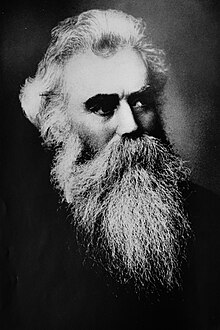Charles Edwin Wilbour
Charles Edwin Wilbour (born March 17, 1833 in Little Compton , Rhode Island , † December 17, 1896 in Paris ) was an American journalist , businessman and Egyptologist .
Life
Charles Wilbour studied from 1850 to 1852 at Brown University , where he received an award for his knowledge of ancient Greek , but could not graduate for health reasons. In 1854 he went to New York and became a court reporter for the New York Herald . In 1858 he married Charlotte Beebee, who was active in the women's rights movement. Wilbour studied law and was admitted to the bar in 1859, but never worked in the field. Mainly he was the owner of a large paper mill. He also translated numerous books from French, including Les Miserables by Victor Hugo (1862/63) and The Life of Jesus by Ernest Renan (1863).
In the 1860s and 70s he became wealthy through his collaboration with the circle around the corrupt politician William M. Tweed . After his arrest in 1874, Wilbour left the United States. He went to Europe, where he studied Egyptology. He studied with Gaston Maspero in Paris and with August Eisenlohr in Berlin and Heidelberg. Wilbour was considered a good expert on the language and archeology of ancient Egypt, but published practically nothing himself, but he was a good observer. In 1880 he visited Egypt for the first time and since then he has lived alternately in winter in Egypt and in summer in France. During five winters he accompanied Gaston Maspero on his travels as director of the Egyptian antiquities administration along the Nile. From 1889 Wilbour continued his trips to Egypt on his own ship The Seven Hathors .
Wilbour died in Paris in 1896 and was buried in Woodlawn Cemetery in New York.
Collection and afterlife
Wilbour brought together an extensive collection of Egyptian antiquities and papyri (e.g. the so-called Wilbour Papyrus or the Brooklyn Papyrus 35.1446 ). In Aswan he bought some Aramaic and hieratic papyri, part of the Elephantine papyri that had been discovered during robbery excavations on Elephantine Island .
After his death in 1916, his family donated his collection of antiquities and his extensive library to the Brooklyn Museum in New York. For the museum, his son Victor Wilbour donated the Charles Edwin Wilbour Fund in 1932 to support his Egyptian collection and library, the library was named after him Wilbour Library of Egyptology. In his honor, his daughter Theodora Wilbour founded the Wilbour Professorship of Egyptology at Brown University after her death in 1948.
literature
- William Burt Cook: Catalog of the Egyptological Library and other Books from the Collection of the late Charles Edwin Wilbour. Brooklyn Museum, Brooklyn NY 1924.
- Charles Edwin Wilbour. Obituary. In: Brooklyn Museum Quarterly 13, 1926, pp. 120-121.
- Jean Capart: An American Egyptologist. Charles Edwin Wilbour. In: Brooklyn Museum Quarterly 19, 1932, ZDB -ID 431660-5 , pp. 45-49.
- Charles Edwin Wilbour: Travels in Egypt. (Dec. 1880 to May 1891). Letters. Edited by Jean Capart. Brooklyn Museum, Brooklyn NY 1936 (Review: LP Kirwan in: The Journal of Egyptian Archeology 23, 1937, ISSN 0307-5133 , pp. 272–273; Casper J. Kraemer in: The Classical Weekly 30, No. 13, ZDB - ID 202620-x , pp. 140-141).
- John A. Wilson: Signs & Wonders upon Pharaoh. A History of American Egyptology. University of Chicago Press, Chicago et al. 1964, pp. 99-109 online (PDF; 27.44 MB) .
- Morris L. Bierbrier: Who was who in Egyptology . 4th revised edition. Egypt Exploration Society. London 2012, ISBN 978-0-85698-207-1 , pp. 576-577.
Web links
- Guide to the Wilbour Archival Collection, Brooklyn Museum ( June 25, 2015 memento on the Internet Archive )
- Deirdre Lawrence: Wilbour: One Man's Obsession with Egypt. at brooklynmuseum.org
- Mark Rose: Wilbour's Legacy . In: Archeology , August 18, 2005
| personal data | |
|---|---|
| SURNAME | Wilbour, Charles Edwin |
| BRIEF DESCRIPTION | American journalist, businessman and Egyptologist |
| DATE OF BIRTH | March 17, 1833 |
| PLACE OF BIRTH | Little Compton , Rhode Island |
| DATE OF DEATH | December 17, 1896 |
| Place of death | Paris |
